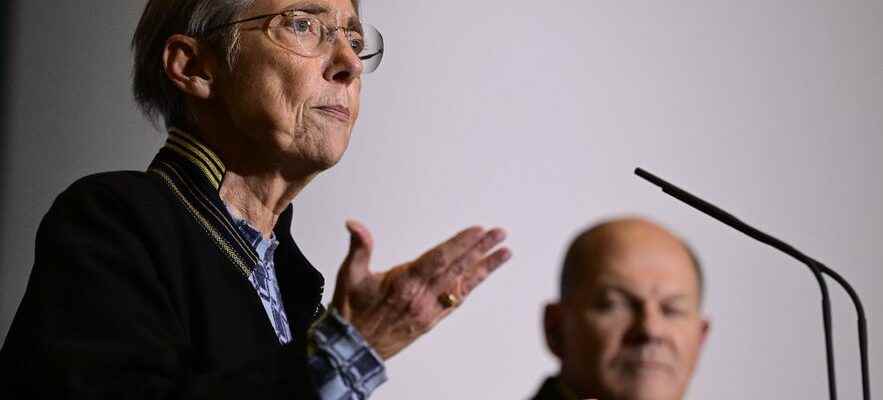Olaf Scholz does not quote France in his great speeches on Europe. To defend the interests of German industrialists, he made a solo visit to the Chinese president. While Europe is in search of more sovereignty, he launches a European anti-missile shield without France… Never, since the era of Gaulle-Adenauer, has a German chancellor irritated Paris so much by his lack of tact and communication.
Since then, mistrust between the two capitals has been at its height. “In Berlin, we suspect Paris of wanting to overtake the Germans. In Paris, we think that Berlin is trying to crush the French”, assures Joachim Bitterlich, the former adviser to Chancellor Helmut Kohl, who deplores a total absence of “Franco-French reflexes”. Germans”. “In my time, with Hubert Védrine, we went towards each other. We avoided crises by talking. I was a permanent conciliation commission on my own, he says. Currently, there is a mix of incomprehension, illusions and contempt. No one wants to listen to the other anymore. The situation is dangerous enough to be seriously concerned.”
Fix the broken pots
Is this the famous “change of era” announced by Olaf Scholz on February 27 at the Federal Assembly (Bundestag), just three days after the invasion of Ukraine? Does it mark a turning point in the privileged relations with France since Konrad Adenauer?
At the Chancellery, we try to repair the broken pots. “After the trip to China, we agreed to coordinate better with Paris,” said a diplomat close to the Chancellor. Instructions were given to “speak with the French press” to defuse a crisis which, for Berlin, is not one. And in the days following Elisabeth Borne’s visit to Berlin, leading members of the German government – Christian Lindner, Robert Habeck and Annalena Baerbock – marched through Paris to see their counterparts.
Elisabeth Borne and Olaf Scholz in Berlin on November 25, 2022
© / afp.com/John MACDOUGALL
Because in Germany, the crisis of the Franco-German couple has gone unnoticed. No special program or talk show has been devoted to the friction between the two countries. For the Germans, the Franco-German couple remains obvious. More than 80% believe that France is the country in which Germany can have the most confidence as an international partner, according to a poll by the Federal Statistics Office on 4 November, well ahead of Great Britain (60 %) and the United States (55%).
A crisis ? What crisis?
“At the Chancellery, we do not understand why the French press is so angry against Germany”, assures Ulrich Wickert, the former figure of the JT of 22 hours on ARD and ex-correspondent of public television in France. This expert in Franco-German relations sees “no crisis”, but a “necessary start” of the Franco-German couple as in the past. “In Germany, we have a new government whose leaders still have to find their bearings, he recalls. This was the case between Schröder and Chirac and between Merkel and Sarkozy.”
There is no reason to doubt Scholz’s sincerity, assure those who knew him as mayor of Hamburg between 2011 and 2018 and as government plenipotentiary in charge of Franco-German cultural relations. “He took his role very seriously,” recalls Najat Vallaud-Belkacem, François Hollande’s former Minister of Education. “Among our foreign counterparts, he is the one with whom we had the most bilateral relations. The start seems difficult, but Olaf Scholz is open-minded. He is conciliatory. All of this can be made up for,” she says.
““Scholz may be Francophile, but he doesn’t know Franco-German.”
In Hamburg, he left the memory of a Francophile mayor. “He’s a big fan of France, he loves French wine,” says Lars Haider, the editor-in-chief of the regional daily. Abendblatt Burger, who closely followed Scholz as mayor of the city. “The United States is important to him, he continues. But Berlin and Paris have always been the European axis for him. He will not change anything in Franco-German relations.”
Scholz, “fish head”
The current “crisis” could above all be explained by the personality and style of the Chancellor, which is not well understood on the French side. The problem is mainly cultural. The Chancellor is a North German, those who are nicknamed the “fish heads” (Fischköppe in Hamburger). “He has a reputation as an austere and boring man. Me, I knew someone very warm, a little tongue-in-cheek, but of a joyful nature”, retorts Najat Vallaud-Belkacem.
While the French president favors symbols, Scholz focuses on content. “When Macron puts his hand on the shoulder of his interlocutor, it makes sense. If Scholz did that, you’d think he wanted to go for a drink,” jokes Lars Haider.
Besides, Olaf Scholz is not a diplomat. “He knows nothing about foreign policy,” assures Ulrich Wickert. In his campaign book, “The Land of Hope” (Hoffnungsland), he does not mention France once. “Scholz may be Francophile, but he does not know Franco-German. This is the reason for the current tensions,” he says.
Finally, the Chancellor seems to govern from his ivory tower. One even wonders if he listens to his foreign policy adviser, Jens Plötner, who nevertheless speaks impeccable French. “His circle of advisers seems extremely small,” says Jacob Ross, expert on Franco-German relations at the German Institute for Foreign Policy. Already in Hamburg, he was known to make decisions on his own. “He has above all confidence in himself”, recalls Lars Haider.
One thing is certain, it is he who will remain the privileged interlocutor of the Elysée. His environmental minister for foreign affairs plays no role in the Franco-German relationship. “Annalena Baerbock talks about foreign policy, Scholz does foreign policy”, summarizes Lars Haider.
